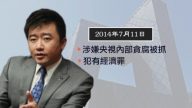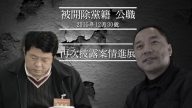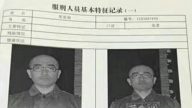【新唐人2014年07月15日讯】好几家大陆媒体都在14号转载了《央视》发布的一份所谓“反腐成绩单”,声称中共“十八大”之后,有35名省部级官员遭到查处。“35”这个数字该如何解读?是多还是少?这背后又折射出中共官场、和中国社会怎样的现状?请看报导。
这35名被查处的省部级官员中,级别最高的,是中央军委原副主席徐才厚,而查处人数最多的是四川省和山西省,都是3人。
距离中共“十八大”,差不多过去了20个月,光是落马的省部级官员,就列出35人的名单,似乎显示出现任领导人习近平“打苍蝇,也打老虎”的反腐行动仍在扩大,甚至不惜造成大陆部分省的中共常委领导班子,出现罕见的“缺员”现象。
例如:由于“杜善学”被免职,山西省空出一名省委常委职务﹔广州市委书记万庆良落马后,广东省委常委也出现一员空缺﹔另外还有江西省委常委、省委秘书长赵智勇被免职等。
时事评论员蓝述:“这种所谓的反腐,实际上都是治标不治本的,解决不了中共官员的腐败问题,至少不能从根本上解决这个问题。它只能降低现行政治体制所承受的这种,来自于中国民间的这种愤怒的呼声。”
而中国民间也在这20个月中持续关注习近平的“反腐”,有一些人叫好,但查处35名省部级官员,真的能暂缓民间的不满吗?
在《新浪微博》上,有网民表示:“几乎现在每天都有官员落马的消息,人们再也没有了兴奋,不是抓贪官不好,是对这样多的贪官被抓已经麻木。”
也有网民写:“如此多的高官落马,在颂扬反腐有力的同时,是否也应该思考为什么会产生这么多贪官?是贪官的道德有问题?提拔的上司有问题还是制度使然?”
时事评论员邢天行:“确实老百姓早就看透了,真正反腐亡党,他不反腐呢,就是亡国。他这种反腐,不是真正意义上的,从腐败这个基点上去清理。他要清除腐败这个体制,首先一点,应该是由民主来监督。”
不过,显然“民主监督”这一点,比“反腐”更令人难以期待。因为,“微博”的相关话题很快都被删除了。
邢天行认为,缺乏民主监督的“反腐”,根本就无法触动到产生腐败的体制本身,而是成为权力斗争的一种借口。
邢天行:“他现在这种大面积的反腐,的确有他背后的背景在。新的这些掌权的人哪,他要推行他的政策,那么他受到了原来的那些,江泽民那些,包括他那个势力集团严重的阻碍。所以他就是形成一个利益上尖锐的对立。他就要借助这个反腐,清除路上这个障碍。”
蓝述则指出,这样的“反腐”即使继续下去,也会陷入“怪圈”,不能给国家和老百姓带来真正的益处。
蓝述:“北京的这些第五代领导人,他不去碰这个政治体制的根本,那这个反腐反到最后,就会变成用打击表面的经济腐败,去巩固核心的政治体制的腐败。它就变成了这么一种怪圈。”
事实上,中共体制造成的官场腐败,长期以来已经扩散到整个中国社会,让中国人不得不开始反思“全民腐败”。
网络大V文史女教师在网上说:是什么原因造就了全民腐败?又是什么因素在推波助澜?日常生活中,我们都会不自觉的这样做:动手术前,给主刀医生递上一个红包﹔学车,给教练递上一条香烟﹔去政府部门办事,要托熟人﹔去开家长会,给班主任送点礼,去领导家送礼还担心送不进去……。其实腐败,我们都有份,也好累。
“不反腐亡国、反腐亡党”,这句话一直在中国民间广为流传,在这样的民间共识面前,《央视》的这张“查处35名省部级官员”的成绩单,到底能打几分呢?
采访/陈汉 编辑/尚燕 后制/李勇
How Much Score Will The People Give to The
“Anti-Corruption Transcript" Issued by CCTV?
On July 14, several mainland media reproduced the so-called
“anti-corruption transcript report" released by CCTV,
which claims that after the 18th Plenary Session of the Chinese
Communist Party (CCP),
35 provincial-level and ministerial-level officials
have been punished.
How to interpret the figure “35″? Is it more, or less?
What sort of current conditions could be reflected
in the CCP officialdom and the social situation in China?
Let’s look at the reports.
Among these 35 provincial and ministerial level officials
who have been punished,
the highest level official is former Vice Chairman of Central
Military Commission Xu Caihou,
and three more officials from the Sichuan Province and Shanxi
Province, all find themselves under investigation.
Since the 18th Plenary Session of CCP, almost 20 months
have since passed.
Only considering the punished provincial and ministerial
level officials, 35 people have been listed,
which seems to indicate, the current leader Xi Jinping
still expands upon his anti-corruption campaign,
with the slogan “Aiming to Corrupted Flies (low level officials),
as well as the “Corrupted Tigers" (highest level officials)".
It is reported, the campaign made no fuss that there are
and will be more vacancies within CCP due to investigations.
For example, the dismissal of “Du Shanxue" vacated
his position as member of Standing Committee
of CCP, Shanxi Province.
The punishment on Wang Qingliang, Head of CCP Guangzhou City,
was also made to vacate his role.
In addition, the sacking of Zhao Zhiyong, another member
of Standing Committee of CCP, Jiangxi Province,
also vacated a similar position.
Political commentator Mr Lan Shu: “Such (so-called)
anti-corruption measures,
are in fact all palliatives (comforts), without solving the root
of the problem of corruption amongst CCP officials,
and it is at least impossible to fundamentally solve the problem.
It can only tone down the angry voice of the people
against this existing political system. “
In the past 20 months, Chinese people also persistently
highlight Xi Jinping’s “anti-corruption" campaign.
Some people applauded it.
But can punishing “35 provincial and ministerial level officials"
really relieve the discontentment of the people?
On Sina “Weibo", one netizen commented: “Almost every day
the news about sacked officials can be heard.
People no longer have the feelings they once had when officials
were punished.
This does not mean punishing the corrupt officials serves
no purpose.
It is merely, the people are numb to the constant arrest
and punishing of these officials."
Another netizen wrote: “So many high-ranking officials
have been sacked.
While we give glorification to the strong anti-corruption
measures now being taken,
should we not be thinking why there are so many corrupt
officials being produced?
Questions remain. Do all officials have moral issues,
or does the problem lie with CCP regime?"
Political commentator Xing Tianxing: “Indeed, the people
have seen through the movement.
If the government really deploys an anti-corruption movement,
then the CCP will die.
If the corruption is not attacked and opposed,
then CCP regime will die also.
So such an anti-corruption is not a real movement
to cleanse the fundamental corruption.
If CCP wants to clean up the corruption within the regime,
then this should be monitored by the democracy
for the foremast. “
But apparently, “democratic supervision" is more difficult
to be obtained than it is the anti- corruption.
Because all related topics on “weibo" are quickly removed.
Xing Tianxing says, the lack of democratic oversight
against corruption,is a near impossibility as it touches upon the corruption
of the institution itself.
This has in fact now become an excuse for more power struggles.
Xing Tianxing: “Such a large-scale anti-corruption at this present
moment in time, indeed has its reasons behind it.
These people who are the newly elected, chiefs of command,
are pursuing their own strength and policies.
Yet the old guys, the original forces, Jiang Zemin and co,
are blocking their commands and policies etc.
So a sharp contradiction among the two parties
has existed for some time now.
Then such an anti-corruption campaign, was in fact
a way of cleaning up the obstacles upon the road."
Lan Shu says, even if such “anti-corruption" continues, we will
fall into one big “vicious circle," which will not bring
any real benefits to the country or its people.
Lan Shu: “These leaders of the fifth generation in Beijing,
they did not touch upon the fundamental political system,
so when the anti-corruption is carried out to the end,
it will turn into a consolidating ( strengthening) of the core
corruption within the political regime,
they will turn it around to fight against surface economic corruption.
It becomes as such a kind of vicious cycle. “
Indeed, the official corruption caused by CCP regime,
has long been spread throughout Chinese society,
the Chinese people are beginning to look at
“Universal Corruption."
One network VIP whose internet name is Female Teacher
of Literature and History says: What is the reason
behind a universal corruption?
What are the factors that fuel it?
In everyday life, we will not consciously think as such:
Before surgery, the surgeon is expected to receive a red
envelope containing lots of money.
When learning to drive, the coach needs to receive a carton of cigarettes;
when dealing with some affairs with governmental departments,
some familiar friends are necessary.
When joining the parental interview,
parents need to present some gifts to the head teacher.
When considering presenting gifts to the leader’s home,
they are worried about if they can send the gifts direct
to their home.
In fact.. we are all responsible for the corruption,
and we all have our share. We are all tired of it.
“No anti-corruption will then mean the CCP regime will die.
If the anti-corruption is fully deployed, then the CCP will die",
this phrase has been widely circulated among Chinese people.
How much score could the real evaluation on the score transcript,
“punishing 35 provincial and ministerial level officials"
issued by the CCTV, earn before the folk consensus?
Interview/ChenHan Edit/ShangYan Post-Production/LiYong























